Rachel Held Evans's Blog, page 10
February 13, 2015
Follow Friday: St. Lydia’s Dinner Church, Brooklyn
Today I want to introduce you to a pastor and a church that might be characterized by some as “nontraditional,” but that seem to me to be modeling a very ancient way of doing church.
St. Lydia’s is a dinner church in Brooklyn. On Sunday and Monday nights, the community gathers to cook and share a sacred meal, just as the first followers of Jesus did. Affiliated with the Evangelical Lutheran Church in America, St. Lydia’s brings together ancient Christian practices with modern, urban living and the results are super-inspiring.
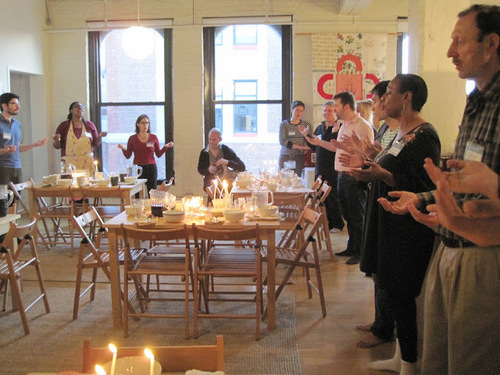
“We do church this way because people are hungry,” explains pastor Emily Scott. “People in New York have hungry bellies that may be filled with home-cooked food. They have hungry souls that may be filled with holy text, holy conversation. And these hungers are sated when we come together and eat.”
I had the pleasure of meeting Emily when I was last in New York, and I am very excited that she will be one of the presenters at the “Why Christian?” event this fall, hosted by myself and Nadia Bolz-Weber. I also feature St. Lydia’s in Searching for Sunday, along with several other churches that are reimagining the ancient sacraments of the church in a modern context.
The other cool thing about the St. Lydia’s community is they have a rather awesome Web site, which really gives you a sense of how the dinner church model works. (Check out the “guided tour” for more on that.) You can also follow them on Twitter and find them on Facebook.
...Oh, and how great is it that their patron saint is one of the most interesting women of the New Testament?!
So, are there other faith communities on your radar that are living out the sacraments of the church in some cool ways? Share them here.


February 4, 2015
Taking The Lead in Developing New Sexual Ethics (by Dianna E. Anderson)
If you’ve been reading the blog for long, you are likely already acquainted with Dianna E. Anderson. Over the past few years, Dianna has submitted guest posts and participated in several roundtable discussions here around feminism, purity culture, modesty, and sexuality. Even when Dianna and I don’t agree 100%, Dianna always engages with kindness, intelligence, and respect, which is why I continue to read her blog religiously and why I’m especially excited about the February 10 release of her first book, Damaged Goods: New Perspectives on Christian Purity ….which is excellent. (Pre-order is available here.) Today Dianna’s talking sexual ethics, which should spark some good conversation. Enjoy!
***
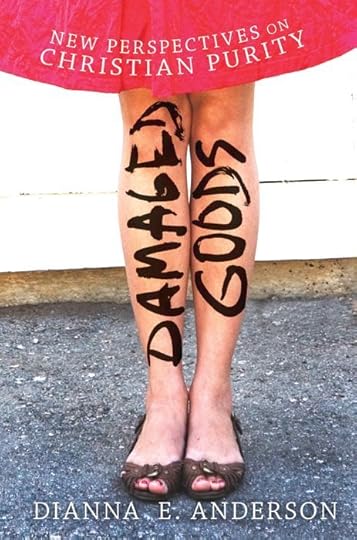
Back in September of 2014, Sarah Diefendorf, a sociologist at the University of Washington, released a study she had conducted. The study followed fifteen men who had made pledges in 2008 to remain abstinent until marriage out of religious belief. Fourteen of those men were married in the six years following that pledge. And, according to interviews Diefendorf conducted with the men, many found little support for engaging in healthy sexual lives following their weddings. Diefendorf concluded that abstinence only education and pledges to remain pure create an unhealthy attitude toward sex that is based on shame, misogyny, and antiquated notions about sexual drives.
While critics are sure to point out flaws with the study, the fact remains that Diefendorf’s work reflects the findings I have come across in my own informal studies of people who make purity pledges. Purity culture is cutting men and women off at the knees in creating an unhealthy focus on virginity the center of their ethical and spiritual lives.
But what is purity culture? Purity culture is the centering of virginity and abstinence as a part of the Gospel message. It is declaring that what makes a person worthy of respect is their sexual purity. Purity culture is a culture that judges moral worth based on sexual experience, and expects women in particular to “behave” as virginal vessels until their wedding day.
The evangelical church in America is deeply invested in purity culture. From pushes for abstinence only education to True Love Waits pledges in youth group, people of my generation are growing up with little actual knowledge about healthy sexuality. Instead, a lot of us struggle with feelings of worthlessness, impurity, and shame, even well into our adult lives and our marriages.
A major part of the problem is that simply saying no to sex until after the wedding is an insufficient ethical system. A system of ethics has to be based on a way of interacting with the world. Sexual ethics need to be complex, positive, and easily applied to varying situations. The abstinence until a heterosexual marriage part of purity culture denies members of the queer community access to the same wrestling with and discussion of sexual ethics. Instead of sexual liberation, we find bondage (and not the fun kind).
Many accuse feminists like myself of wanting the world to be a debauched, libertine, orgiastic sin-fest. But this isn’t what sexual liberation means. Instead, liberation is the ability to choose for ourselves how we will engage in sexual activity and explore our sexual lives. It means a sexual life free of shame, of condemnation, of accusations of sin. It means forming a life-giving sexual ethic, instead of one based on shame and saying no.
A sexual ethic needs, first and foremost, to be based on knowledge of yourself as a person. It needs to give you room enough to explore your own wants and needs and desires free of shame. You cannot say yes until you know how to say yes for yourself and what sexual activity means to you, in particular, not forced on you from what culture or church have told you.
A sexual ethic also requires communication – communication not only about consent to the activity in question, but communication about each partner’s wants and desires and views about sexual activity. This type of communication is vital not only to having singular healthy sexual experiences, but also to build and understand your sexual compatibility with a person.
A sexual ethic also needs to engage in a healthy way with your belief system or your faith. For so many young women and men who grew up in the 1990s and the 00s, God is a God of sexual shame, a heavenly father who sits upon his throne and condemns. A healthy ethical system removes shame from the picture of God. We don’t engage in our faith system because we enjoy being shamed – we shouldn’t, then, build sexual ethics out of shame. Instead, engaging your faith in your sexual ethics can be a good way to arrive at God’s calling for your life.
When working on my book, I spoke with nearly a hundred men and women from all over the United States about their experiences in the church. Many of them spoke of struggling within their marriage with learning how to be sexual beings, and learning how to say yes. They had been impressed – through youth groups, through purity teachings, through abstinence only education – with the idea that sex is always, always dirty and shameful.
We, as the church, must take the lead in correcting our mistakes. We must teach consent, communication, grace, love, and healthy boundaries in talking about sex. Simply saying “no” until the wedding day isn’t enough to equip people with the tools to live out their sexuality in a healthy, God-honoring way. We need to learn how to be sexually mature adults before we can talk about what it means say yes or no.
***
Thoughts? Agree or disagree? Do Christians need new sexual ethics and what might those look like?
For more, be sure to check out Damaged Goods: New Perspectives on Christian Purity.


February 1, 2015
Keep the Church Weird
I’ll be offline for most of the week in order to jump-start work on book #4. In the meantime, this lecture from the fall gives you a little glimpse of the heart behind book #3, Searching for Sunday, which releases this April. The talk is entitled “Keep the Church Weird.” It was presented at Canterbury United Methodist Church in Birmingham, Alabama and was filmed by Dan. (If you’re interested in booking me to speak, contact my speaking agent, Jim Chaffee.)


January 30, 2015
[Video] The Archbishop, Inequality, and Me
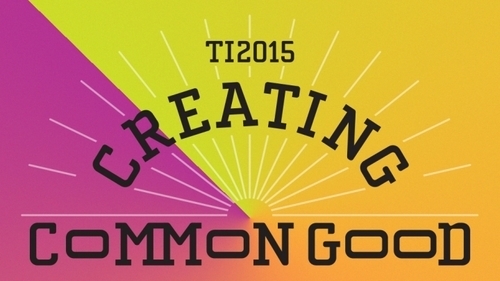
Last week I had the distinct honor and privilege of joining a formidable group of clergy, activists, advocates, and scholars for The Trinity Institute’s Creating Common Good conference on economic inequality in New York City.
Joining the likes of Cornel West and the Archbishop of Canterbury left me feeling a little (….okay, a lot….) out of my depth, so I focused on listening and learning, taking furious notes during each keynote, notes I managed to lose somewhere on the great island of Manhattan along with any notion that I could survive winters there.
Thankfully, videos from nearly the entire conference are available online.
I participated in two panels:
“Is Inequality Sinful?” with Justin Welby, (Archbishop of Canterbury),
Rt. Rev. Julio Murray (Bishop of Panama), and R.R. Reno (editor of First Things)
“The Agape Community” with Amy Butler (Riverside Church), Jennifer Jones Austin (Federation of Protestant Welfare Agencies), Douglas Meeks (Vanderbilt Divinity School), and Rt. Rev. Julio Murray (Bishop of Panama).
[Of the two, I especially recommend “The Agape Community.” Lots of practical ideas for addressing inequality from my fellow panelists in that one.]
My favorite keynotes included Julio Murray’s “The Agape Community,” Cornel West’s “The Rich and the Rest of Us”, and Barbara Ehrenreich’s “Nickel and Dimed.”
So if it’s still too cold to go out this weekend, consider brewing some coffee, getting out a notebook, and jotting down some ideas for how you and your church might better engage the pervasive problem of inequity.
…And don’t judge me for wearing jeans at The Trinity Institute. I’m told Stanley Hauerwas did the same thing once too.


January 18, 2015
Sunday Superlatives 1/18/15
A highlight of the week was the opportunity to spend some time with Jonathan Martin, one of my favorite writers and just a kind, open-hearted, and wise person. Dan and I enjoyed giving Jonathan a little tour of Dayton and enjoying a tasty meal and rich conversation. Few people have been as encouraging and supportive of my work as Jonathan. I’m so grateful for his friendship and insights. Be sure to check out his writing. He and Dan are both very tall!
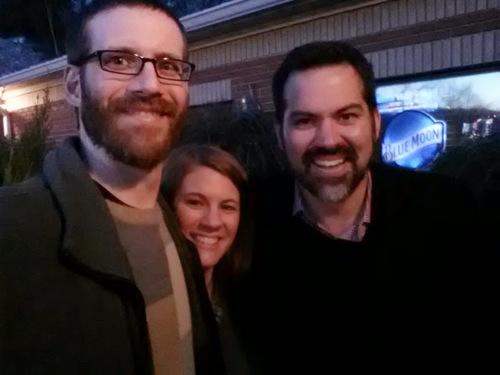
Another gift this week was the chance to worship again at St. Luke’s Episcopal Church in Cleveland, Tennessee, which has become our church family, and which I write about in Searching for Sunday. I took advantage of a bright blue sky on Sunday to get a photo:
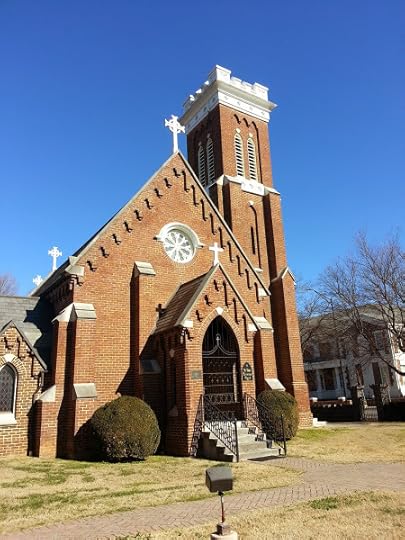
You can find more snapshots of “real life” at Instagram.
Around the Blogosphere…
Funniest:
“Dad Fills Out Daycare Questionnaire Honestly For His 11-month-old Daughter”
Wisest:
Ben Irwin with “The Day I Was Walter Brueggemann”
“For Brueggemann, reading the Bible well requires navigating between two extremes: the literalist impulse of fundamentalism and the historicist impulse of rationalism. One treats everything as literal, historical fact, imposing modern expectations of “accuracy” and “precision” on ancient texts. The other denies any meaningful connection between the text and reality. Both reflect a reductionist approach to the Bible. Both fail to consider the importance of genre when reading scripture—the codes, if you will, through which the authors described (and critiqued) reality for their audience.”
Coolest:
NASA takes biggest picture ever
Most Relatable:
Mike McHargue with “Shamed and Shunned”
“Churches are full of people hiding. I'm in the Atlanta airport as I write this, and during this layover I've gotten three messages from people who asked me for advice because they are afraid of being ‘found out’ at church. One is a man who doubts a lot about the Bible and wonders if God is real or not. Another is a person who told me she's afraid of going to Hell because her beliefs about God have changed–even though she's still captivated by Jesus. The third is a young woman who is exclusively attracted to other women. All three of these people long to know and feel close to God. All three are terrified of discussing their relationship with God with their friends at Church, and are even more afraid of talking to their pastors. Houston, we have a problem.”
Most Powerful:
Benjamin Moberg at Sojourners with “LGBTQ Christians: Hope for the Unseen”
“There were fifteen hundred people in Portland. There were 46 states and 14 countries represented. There were major cultural leaders speaking as keynotes. There were remarkable moments, like when Justin Lee announced his plans to meet with the president of Focus on the Family to discuss LGBTQ youth homeless rates. Yet none of the major Christian media outlets covered the conference. None of them told our story. None of them bothered to show. And in their silence was their declaration: You do not exist."
Most Eye-Opening:
Jennifer Soble with “We lock up poorest, not most dangerous” and Joseph Shapiro at NPR with “How Driver’s License Suspensions Unfairly Target the Poor”
Most Enlightening:
Alix Spiegel and Lulu Miller at This American Life with “Batman”
Most Challenging:
Rev. Amy Butler with “Will the Church Fail or Fulfill Martin Luther King Jr's Legacy?”
“The deep and foundational tragedy of Ferguson and New York and so many other places across our country is that people who live and work and raise families in the same neighborhoods do not know each other, do not understand each other, and therefore cannot love each other.”
Most Insightful:
Kelley Nikondeha at She Loves with “Jerusalem, Jerusalem”
“The question remains–why do we resist gathering? Why are we willing to stone the prophets but unwilling to gather under God’s wing? Maybe we don’t want to hear that the ways that seem normative to us, defending ourselves and nursing our prejudices, are ineffective. Maybe we are hesitant to see who else gathers under the wing of Jesus. Maybe we think we are beyond the need of a mother or any need of nurture. Maybe we’re afraid there will be too many or they’ll be too different and we like our idea of a select, similar few.”
Best Tribute:
Jelani Greenridge with “If You Love American Music, You Have Andraé Crouch to Thank”
“…The legacy that Andraé Crouch represents is a combination of musical excellence and a fearless sense of multicultural inclusion.”
Best Reflection:
Sarah Bessey with “A Lament for Nigeria”
Best Response:
Kate Wallace at The Junia Project with “They Say the Church is Feminine”
“Women may indeed make up the majority of people in the pews (for now), but they do not make up even half of the people who make decisions about church services or experience. If men really aren’t going to church, it doesn’t seem to be the fault of women. Perhaps the Church leaders who are making these claims should stop shaming the faithful, and start asking them for help…Yes we need men in our pews. We also need women in our pulpits, on our elder boards, at the communion tables, on the worship teams, and in our denominational leadership. The Church is “too feminine”? No. I’d say the Church isn’t feminine enough.”
News…
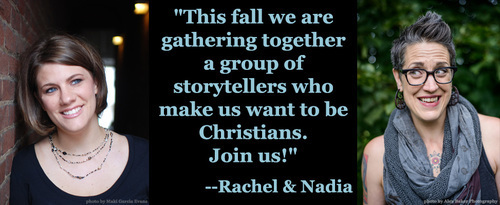
We’ve had an AMAZING response to the announcement that Nadia Bolz-Weber and I are teaming up to host “Why Christian?” – an event scheduled for Fall 2015 that will bring together a group of storytellers whose work reminds us why we follow Jesus in the first place. Learn more at NadiaAndRachel, and register soon as the spots are filling fast!
***
So, what caught your eye online this week? What are you reading? What’s happening on your blog?


January 17, 2015
Marriage, Ministry, and “Troubling the Waters”: A Guest Post from Andy Kort
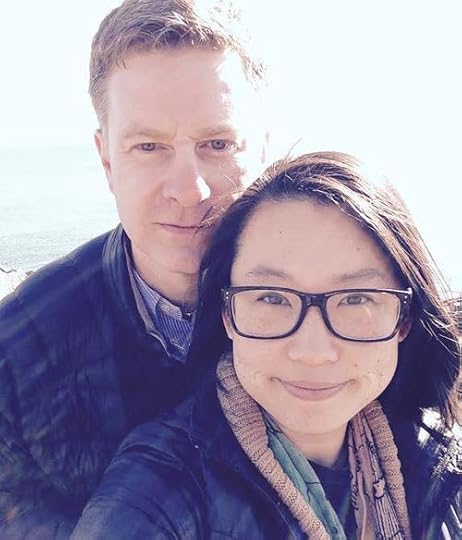
Andy Kort and Mihee Kim-Kort are Presbyterian (PCUSA) clergy who live and work in Bloomington, Indiana. Andy is pastor of First Presbyterian Church and currently working on his Doctor of Ministry at Pittsburgh Theological Seminary. On any given day he can be found enjoying a solid cup of coffee, running at the Y, or bemoaning the plight of Pittsburgh sports. Mihee is the staff person for UKIRK @ IU - a campus ministry to Indiana University students and spends her days reading and writing snippets on her phone while chasing after their three kids.
Today’s post is an excerpt from Yoked: Stories of a Clergy Couple in Marriage, Family and Ministry, a collection of true stories is written by Mihee and Andy. They share their unique perspective on the joys and challenges of ministry in alternating segments, forming a collective narrative that illuminates the inner workings of a clergy marriage, even as it inspires with heartfelt tales of life in ministry. This excerpt is from a chapter written by Andy, who talks about the two voices—his father’s and his wife’s— that have shaped his own voice in his identity as a preacher and pastor. Enjoy!
***
Mihee’s voice reminds me of line in the old hymn “Wade in the Water” that speaks to God’s “troubling” the water. I never really understood what that meant, and I’m still not sure I do. But as I think more about it, I have come to imagine it is a reference to God’s active participation in this world. The still, peaceful, and easy waters of this world often invite us to a state of placidness. At the worst, we simply go along with the flow, afraid to deal with all of the challenges that come with making ripples, let alone waves. Perhaps God troubling the water causes us to, or calls us, to the radical work that causes ordinary folks to drop their proverbial nets and follow a certain rabbi.
Mihee’s prophetic voice has troubled the waters of what, I am sure, could have been, and at times still might be, a glassy-lake life and ministry. As we took classes like “Cultural Hermeneutics” together and other classes in theology, she challenged me in a way that Calvin, Barth, or Augustine could not. I was suddenly engaged in, found myself thinking about, and talking about, issues that as a white middle-class suburban American male I had not had to wrestle with before. I looked at church, my preaching, my use of words, my relations with others, and the larger world in way that was new to me.
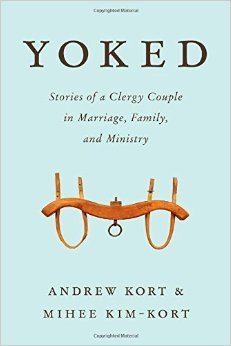
I began to think about the power and the impact of one’s voice. As she began serving her churches as an Associate Pastor, I really began to think about even the little comments we make to each other. This is because she would share with me some of what others have said to her, comments literally about her voice—“talk louder and use the mic!”—the well-intentioned, but condescending, comments about how young and cute she looked in her big black robe while leading worship—“just like my granddaughter!” After we had been married for a few years she was asked the question that is no-one’s business: “When are you going to have kids?” I’ve had my fair share of stupid comments about my beard or haircut or tie, but I can let those roll off after a few minutes of shaking my head. But when it happens to Mihee, something within me stirs to make sure that I am never that insensitive to another. I’m not sure I’d be aware of these things, or give them much thought, if I was not married to a member of the clergy.
Mihee’s voice troubled the waters and as a result re-shaped my still developing voice. I’m not going to lie and say it was, or is, an easy process. I saw things in myself and I listened to things about her life that are hard. But as these conversations, fights, and experiences played out I have come to see that she has influenced me in ways that my dad, or anyone else for that matter, could not.
She has taught me that my voice is useless—a clanging gong or a noisy cymbal—if I don’t back it up with action. If I don’t “practice what I preach,” as they say, then what good does it do? Mostly she has challenged me to be more courageous. She has challenged me to live with conviction. She has taught me how to remain faithful (or at least try to) in the midst of hardship and the confusion that comes with asking “How long O Lord?” …She has gently pulled, pushed, and kicked me out of my zone of comfort and familiarity.
But as I continue to grow in life the more I can see that while I am influenced by, and who I am because of, many people, I am still God’s unique creation—with my own voice.
***
Be sure to check out Yoked: Stories of a Clergy Couple in Marriage, Family and Ministry by Andy Kort and Mihee Kim-Kort.


January 16, 2015
Follow Friday: April Fiet
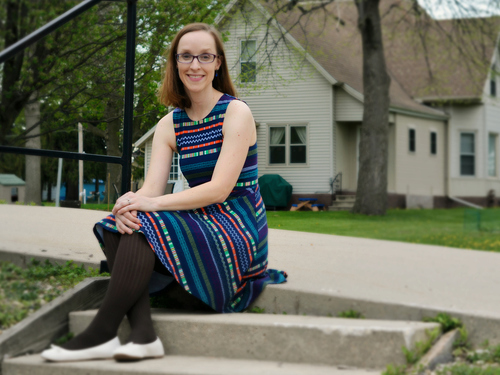
Wendy Miller Photography
I’m adding a new feature to the blog this year where I highlight smart and inspiring people to follow on both social media and in life.
Today I want to make sure you’re keeping up with April Fiet, another great writer and faithful pastor whose blog has really picked up momentum in the last few months. What I love about April’s work is that it is deeply rooted in real-life community as she serves as a pastor to a rural RCA (Reformed Church of America) community in Iowa. On her About page, April writes:
During my time in seminary, my husband and I traveled to be with his extended family for his mother’s funeral service. Following the service, we were able to spend time grieving, hugging, and talking with family members we hadn’t seen in quite some time. Then someone asked me what I hoped to do once I graduated from seminary. I answered, “I don’t know. I don’t want to be a trailblazer.” She responded, “Oh, honey, you already are.”
And that frustrated me so much. I never wanted that. In elementary school, I was painfully shy, and even as an adult I’ve had to fight against a deeply-ingrained desire for everyone to like me. But for some reason, God kept calling me. I keep on preaching, speaking, and writing, and by the grace of God the whole thing holds together.
I think the first post of April’s that really caught my attention was “When God Calls a Complementarian Woman Into Ministry.” But since then I’ve been drawn back again and again by her unique point of view, as exhibited in posts like “Growing Into Authority,” “10 Reasons Rural Ministry is Great,” and “The Reality of Rural Poverty,” I’ve even been reading her series on Reformed Theology!
People make a lot of assumptions about women pastors—that they have to be aggressively ambitious, that they can only survive in a liberal and urban environment, that they can’t serve in Reformed churches, that they must devote all their work and writing to defending their call. April shatters all these myths with both her writing and her example. I'm so very glad I found her!
Be sure to subscribe to April's blog, follow her on Twitter, and find her on Facebook.


January 14, 2015
Post-Evangelicals and Why We Can’t Just Get Over It

© 2011 Archangel12, Flickr | CC-BY | via Wylio
It’s strange how the ghosts of your last church haunt the new one.
You’ll be doing the hard part, the showing up part, and suddenly a word or a song or the presence of a plate of deviled eggs grinning back at in you in the fellowship hall will flood every sense with memory—at once nostalgic and painful, comforting and sad. You will eye the nearest exit, wondering if the ghosts can follow you out the building, if you’ll ever really shake them for good.
I remember when I first heard the term “post-evangelical,” how I hated it and loved it at the same time. Oh, I rolled my eyes at its pretension, its unapologetic smacking of smarter-than-thou. And yet I glommed on to the label, to any label really, because a label means you’re not alone. A label means you can be classified along with species of a similar nature. A label gives you a family, an order, a name.
“It’s nice to be Episcopalian now and not post-evangelical,” I told Dan on the way home from church one cloudy afternoon, feigning a security I didn’t actually feel. “Who wants to be defined by what they’re not?”
“I don’t know,” Dan said, calling my bluff. “Seems like we’re all a little post-something.”
I’ve been reading articles lately about how people like me need to just get over it already, either suck it up and embrace evangelicalism or pack up and move on. The writers accuse us of painting with broad brushes (this is often true), of consumerism (this is sometimes true), of abandoning orthodoxy (this is rarely true), of deconstructing just for sport (this is almost never true). Then they charge us with printing up silly, oversimplified labels to slap onto all that we condemn, and I can’t help but recall all the labels I learned from them—feminist, liberal, postmodern, evolutionist, nominal, lukewarm, heretic—and think, where do you think we learned how to do this, folks?
Sure we tend to over-share. Sure blog posts recounting 10 Ways Evangelicalism Failed Me are a dime a dozen. But when you grow up believing everyone outside evangelical Christianity is going to get spewed from God’s mouth at best or cooked for eternity in hell at worst, when the people you love most in the world belong to the evangelical community and want you to belong to it too, making a deliberate step out of that tradition is a big deal. When you grow up believing that your religious worldview contains the key to absolute truth and provides an answer to every question, you never really get over the disappointment of learning that it doesn't.
It’s a lonely, frightening journey and most of us are limping along as best we can.
My little evangelical church in Birmingham, Alabama was the first place, outside of my immediate family, where I knew I belonged, where I knew I was loved. It was the community that introduced me to Jesus, that lowered me into a still pool of water and called me child of God. It was evangelicalism that taught me to value the Bible, to give and receive testimony, to totally slay the motions for “Father Abraham,” to make deviled eggs. And it was evangelicalism that first told me that being a woman limited my potential, that science was not to be trusted, that democrats and gay people and Episcopalians were my enemies, that asking questions about these things was wrong.
It was evangelicalism that told me who I was and it was evangelicalism that told me who I wasn’t. You don’t just get over that. You don’t just trash it all and walk away.
Like it or not, our religious traditions help forge our identities. The great challenge, the one that took me a book to articulate and which I suspect will take me a lifetime to work out, is to hold every piece of my faith experience in love, even the broken bits, even the parts that still cut my hands and make them bleed.
We are all post-something.
We are all caught between who we once were and who we will be, the ghosts of past certainties gripping at our ankles.
There’s no just getting over it. There’s no easy moving on.
So I ask for grace—from the communities that now receive me and from the one that first taught me what that word means.


January 13, 2015
Ask a Womanist Biblical Scholar....(Response)
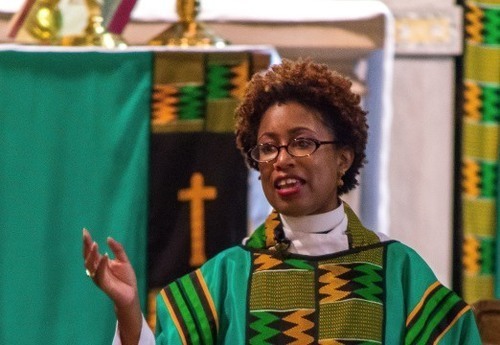
We’re picking up our popular “Ask a…” series in the new year, beginning with “Ask a womanist biblical scholar…”
The Reverend Wil Gafney, Ph.D. is Associate Professor of Hebrew Bible at Brite Divinity School in Fort Worth, Texas and is an Episcopal priest canonically resident in the Diocese of Pennsylvania and licensed in the Diocese of Fort Worth. A scholar of prophets, prophecy and prophetic texts in ancient Israel and surrounding cultures specializing in women prophets, she also specializes in womanist and feminist ways of reading scripture. A particular love is the Hebrew language - reading, teaching, studying - and classical rabbinic (Jewish) biblical scholarship. Dr. Gafney is the author of Daughters of Miriam: Women Prophets in Ancient Israel, and the Peoples’ Bible, which she co-edited, available through Fortress Press.
You posed some really great questions to Dr. Gafney last week, and I think you will be challenged and enlightened by her responses. Enjoy!
***
From Dr. Gafney: Rachel, thank you for the invitation to participate in this conversation. Thank you all for these engaging questions. The professor in me sometimes resists and reframes some language and what look like presuppositions. Please accept that reframing in the spirit of teaching and learning and conversation.
From Marcus: I'm not terribly familiar with womanism. Should I consider it a movement separate from feminism? Intersecting with feminism? Or as a movement designed to work within the feminist movement as a reformation movement (similar to the early church in Jerusalem to Judaism, or the Tea Party within the Republican Party)? If it's not the latter, how has traditional feminism proven itself to be inadequate for addressing issues which womanism addresses?
Dear Marcus, womanism and feminism are parallel and intersecting and divergent. Womanism is a response to racism in feminism and sexism in the Black Liberation movement. One crucial aspect of womanism that sets it apart from feminism is the emphasis on the well-being of the entire community. Alice Walker’s definition of womanism is the ancestral, founding articulation. It is long but I think it is important to reproduce it in full since it is so often abbreviated:
1. From womanish. (Opp. of “girlish,” i.e., frivolous, irresponsible, not serious.) A black feminist or feminist of color. From the black folk expression of mothers to female children, “You acting womanish,” i.e., like a woman. Usually referring to outrageous, audacious, courageous or willful behavior. Wanting to know more and in greater depth than is considered “good” for one. Interested in grown-up doings. Acting grown up. Being grown up. Interchangeable with another black folk expression: “You trying to be grown.” Responsible. In charge. Serious.
2. Also: A woman who loves other women, sexually and/or nonsexually. Appreciates and prefers women’s culture, women’s emotional flexibility (values tears as a natural counter-balance of laughter) and women’s strength. Sometimes loves individual men, sexually and/or nonsexually. Committed to survival and wholeness of entire people, male and female. Not a separatist, except periodically, for health. Traditionally universalist, as in: “Mamma, why are we brown, pink, and yellow, and our cousins are white, beige, and black?” Ans.: “Well, you know the colored race is just like a flower garden, with every color flower represented.” Traditionally capable, as in: “Mamma, I'm walking to Canada and I'm taking you and a bunch of other slaves with me.” Reply: “It wouldn't be the first time.” 3. Loves music. Loves dance. Loves the moon. Loves the Spirit. Loves love and food and roundness. Loves struggle. Loves the Folk. Loves herself. Regardless. 4. Womanist is to feminist as purple is to lavender. (In Search of Our Mothers’ Gardens: Womanist Prose. San Diego, CA: Harcourt Brace Jovanovich, 1983, xi.)
From Devin: Womanism seems like a difficult perspective from which to tackle the Old Testament in particular. Would you say that womanist perspectives on the Old Testament are more about finding the redemptive notes in what I often take to be an oppressive narrative for women, or is it more about reimagining the central messages and letting it speak fresh to a modern reader?
Devin, I wonder what your presuppositions are about the Hebrew Bible and black women’s feminism. For whom is reading Hebrew Bible not difficult? Perhaps those who identify with the dominant voice? I do teach and study Hebrew Bible and not OT. The Hebrew Scriptures are full and complete, do not need to be supplemented and have not been replaced.
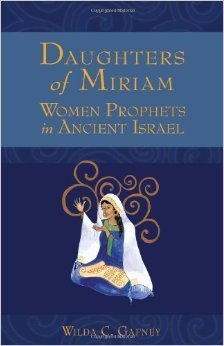
For me, living, praying, reading, writing and living Hebrew Bible as a black woman is no more problematic than being a black woman in the Americas. My primary approach to the text is to look/listen for what it has to say. I expect it to be revelatory and illuminating because it is scripture and for me as an Episcopalian; those are my presuppositions. That means God’s words are in there somewhere and, knowing the text is androcentric, patriarchal, kyriarchal, hegemonic and full of cultural biases – like America, (minus the kyriarchy but the oligarchy is coming close). And, because the Word is both human and divine, I know it will be swaddled in the stuff of flesh. The Hebrew Scriptures are rich and full of life in all of its and their complexities; the God revealed in its pages transcends the limited and limiting portrayal in the text, pointing to a God beyond the text who is shadowed by God in the text. Even though only about 9% of female characters have names in the text, there are more than one hundred “eleventy” (111) women’s names that are preserved. So many rich stories among them that are largely neglected and more among the nameless women and missing characters including women who wield power and authority and successfully negotiate the androcentric framing of the text.
From Leanne: While there are many women in the Bible, growing up in a more conservative home and faith I often found they focused more on the negative representations of women and glossed over quickly the more positive ones. When I left the traditions of my family and when more mainstream, I have been pleasantly surprised by the stories of women in the Bible. Which story of a woman in Scripture do you find most liberating and why?
Dear Leanne, I don’t know when I have ever not been free. I don’t think of a particular woman’s story as liberating. Empowering is the word that comes to mind; there are a couple that have stayed with me. The prophet Huldah was the first life-changing woman for me. Having not realized there were women prophets – which are now something of a specialty for me [Daughters of Miriam] – I wondered why folk ever had a conversation about women preaching when women preached as prophets in the bible. The woman who had the biggest effect on me in my preaching and teaching was Sheerah. The knowledge that a woman built three cities in Israel and Canaan, and that they endured, perhaps until today, helped me to stop reading the text through an exclusively male lens and to look for obscure and neglected texts, particularly in genealogy.
From Erin: Thank you for participating, Dr. Gafney. We hear a lot about first wave, second wave, and third wave feminism. Applicable or not, they are difficult to share with girls and young women. How would you share womanism with a 5 year old? A 12 year old? A 19 year old? How would you model your values in ways younger people can understand?
(Similarly, Rebecca asked: I am a young female youth minister living in the south. How can I walk with my youth who are mostly the children of privilege, in ways that they see the liberating call of the Gospel. How can I teach my girls who are already so heavily immersed in patriarchy about the freedom that Christ has for them in the Gospel?)
Rebecca and Erin, Teaching a girl that she matters, that her voice and ideas matter even when others say they don’t is appropriate at any age. I have been an out feminist and womanist my entire clergy and scholarly career. Girls have always been able to see and hear that in my experience. Some of my practices are using explicitly feminist God-language, not just “inclusive” because folk hear/see/imagine a male god when they hear “God.” I also chose to be known as Father Wil when I became a priest so that the male priests and I would have the same title – which in that church they also used for God. When the Sunday School teacher told the 5 year-olds, “This is Father Wil and she’s going to say our Mass today,” the little girls’ eyes lit up and they sat up. The paradigm shifted before their eyes. There was another woman priest but she used a different title and I felt was seen/placed in a different category.
I don’t know that we can talk about freedom in the gospel without talking about freedom from the enslaving paradigms with which it is also framed and which are constitutive of it. That means talking about androcentrism, patriarchy, sexism and misogyny in the scriptures and in the church from the pulpit, in the theological classroom, in congregational conversations, in public theology and the scholarly literature. We must talk about slavery in the gospels, about Jesus healing but not freeing slaves and using the language of slavery as normative.
From Anand: I see you've served as an army chaplain. How does that experience inform your theology in ways that differ from many with a feminist/womanist perspective?
Dear Anand, one of the great gifts of military ministry is comfort with and acceptance of death in a way I haven’t experienced in the civilian world. That familiarity and acceptance is not just towards the inevitability of soldiers dying, but also killing. I am much more comfortable with deliberate acts of violence – waging war, self-defense – than many other feminists and womanists I know. The stories of women who kill in scriptures are among those I teach and preach regularly, Deborah, Jael, Judith, Athaliah.
From Rachel: For those new to the conversation, what books about womanism and Christianity would you most recommend as primers?
Rachel, these are just a few of my favorite classic womanist texts:
Renita Weems: Just A Sister Away and I Asked For Intimacy
Delores Williams: Sisters in the Wilderness
Katie Cannon: Katie’s Canon: Womanism and the Soul of the Black Community
From Dan: I'd like to hear from Dr. Gafney what she'd most like a white, comfortable, middle-aged Englishman like me to understand about her study and perspective.
Dear Dan, first I’d like you to know something about your perspective that you may already know, that it is not the only one nor even the “right” one. Womanism is black women’s interpretation but it is not only for black women. Womanist biblical interpretation enriches every person and every community’s understanding of the biblical text. There are things you will never see in the text without reading in the company of black women. In the post-colonial, post-Atlantic slave trade world, it is crucial that peoples who have historically benefited from the sale and plunder of black women’s bodies, justifying those practices with their readings of scripture learn to hear and the scriptures in our voices and through our eyes.
Thank you all for your questions. Thanks again to Rachel for the invitation. I invite you to explore the #BriteBible and #what2preach hashtags on Twitter to see two different kinds of womanist work in the public square. The former is a collection of tweets from my Introduction to Interpreting the Hebrew Bible course at Brite Divinity School. The latter is my response to national tragedies from the Newtown massacre to the aftermath of Ferguson, to and for preachers struggling with what to preach.
***
A huge thank-you to Dr. Gafney for taking the time to so thoughtfully engage us! Be sure to check out her Web site, read her books, and follow her on Twitter.


January 11, 2015
Sunday Superlatives 1/11/2015

© 2007 Sharon Mollerus, Flickr | CC-BY | via WylioAround the Blogosphere…
Best Thing You’ll See/Read All Week:
Jeff Chu gave an amazing talk—the kind that reminds me why I’m a Christian— at the opening session of the Gay Christian Network conference in Portland this week, which you can watch here for a limited time, or read here. An excerpt:
“The table I long for—the church I hope for—is a place where we let others see where the spirit meets the bone and help heal the wounds. The table I long for—the church I hope for—has the grace of the Gospel as its magnificent centerpiece. The table I long for—the church I hope for—is where we care more about our companions than about winning our arguments with them, where we set aside the condescension that accompanies our notion that we need to bring them our truth. The table I long for—the church I hope for—has each of you sitting around it, struggling to hold the knowledge that you, vulnerable you and courageous you, are beloved by God, not just welcome but desperately, fiercely wanted.”
Then, just when you think it can't get any better, Vicky Beeching hits it out of the park with her presentation about what it was like growing up, living, and leading in the evangelical culture, while (until recently) keeping her sexuality a secret. Her perspective on how “a questioning faith is not a backsliding faith, but a maturing faith” is applicable to all and really encouraged me this week. You can watch all the keynotes from GCN for a limited time here.
Best Insight:
Richard Beck with “Being Biblical Means Being Doctrinally Tolerant”
“If your are going to accept the burden of being of Protestant, of living with sola scriptura, then you are going to have to learn to welcome doctrinal diversity.”
Best Interview:
Mychal Denzel Smith interviews Ava DuVernay about ‘Selma’
“…It is rare to have a black storyteller have some autonomy over the story. Also it's just rare to have a black storyteller telling the story when it comes to history, period. So I think when you don't have that, you have this kind of groupthink that turns into a homogenization of the events, turns into us not being at the center of our own story, as people of color or women or what have you, and this kind of smoothing of the edges starts to happen, and that starts to contribute to this whole idea of "ugh, the same old thing." And so with this I was very focused on not letting that happen. For whatever people think about the film, whether they love it or hate it, it is the vision of a black storyteller undiluted. For whatever that means for the way we are presented as people of color on screen. I think part of the reaction that some people have to history, particularly around black history, is just the way that it's been told and by whom.”
Best Reminder:
Bronwyn Lea at She Loves with “The Secret of Hospitality (Hint: It’s NOT Space)”
“I breathed in deeply and heard my younger self speak kindly to me: “You have space enough. You may not have seats enough, or plates enough–but you have love enough, and that is enough.”
Best Perspective:
Katherine Willis Pershey with “The Long Obedience”
“A ‘long obedience in the same direction’ has its stretches marked by the strain of toil and the fret of care, but it also has its glorious mountaintop vistas and the camaraderie of good company. And sometimes—if you so happen to land in a place that knows how to party—a three-piece band playing Dixieland jazz sets up shop outside the sanctuary to fete you as you make your way to the fellowship hall to greet hundreds of people who love you because you have loved them so very, very well. If you ask me, nothing says “well done, good and faithful servant” like a tuba, a clarinet, and a banjo.”
Wisest:
Rob Dixon at The Junia Project with “5 Reasons Not To Use Gender-Based Jokes in the Pulpit”
Funniest:
The Onion with "Dirty Slush Machine Provides Children In Florida Taste Of Winter”
Truest:
Jamie Wright with “Depression is Not a Scandal”
“…It's time to pull back the cover. It's time to give people the space and freedom to talk openly about depression without stigma, without shame, and without embarrassment. This is not a sin issue, this is not a prayer issue, this is not a faith issue – it's a medical issue and it should be treated like any other medical issue, with medication and/or therapy.”
Coolest:
NASA produces vintage travel posters for newly discovered planets
Most Relatable:
Jonathan Martin with “On Going to (an Episcopal) Church”
“I loved that it never felt like the church was trying to sell me anything. I loved that really, nobody is fussed over at all—there is just is not that kind of VIP treatment for anybody. The vibe is, “this is the kind of worship we do here, and you are welcome to come and do this with us…or not.” The liturgy there does not try to coerce everyone into the same emotional experience, but in its corporate unity strangely creates space for us all to have a very personal experience of God. I have commented to friends that I have never actually prayed this much in church before.”
Most Unsurprising (But Important):
Kathleen Davis with “The One Word Men Never See in Their Performance Reviews”
The Orphan Master’s Son by Adam Johnson
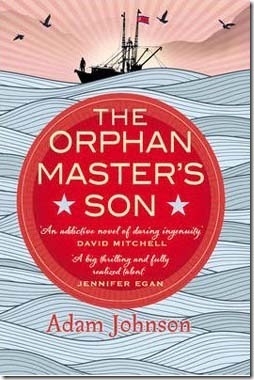
This year I vowed that, before I spent a fortune on new books, I would read some of the novels that have been piling up in my office over the last few years. Well, the year got off to an amazing start with The Orphan Master’s Son by Adam Johnson (2012).
Winner of the Pulitzer Prize, this novel has everything: a captivating plot, complicated characters, drama, intrigue, and small but powerful moments of tenderness and humanity. Set in North Korea, a country that has long fascinated me, The Orphan Master’s Son follows the unlikely journey of one man, Jun Do, from a penniless childhood to the powerful inner circle of Kim Jong Il.
The most surprising part about the novel to me was its humor. In the midst of scenes of suffering, and even evil, Johnson knows right when to weave in a bit of levity. The book is masterfully crafted. I stayed up until 3 a.m. finishing it.
Salvage the Bones by Jesmyn Ward
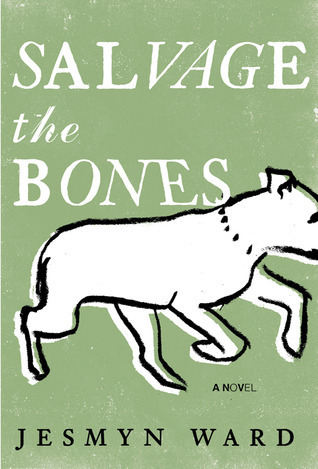
I first learned of Jesmyn Ward when I listened to her read from her memoir, Men We Reaped. I wanted to go back to her fiction and so I found myself drawn into the stark, breathtaking world of Salvage the Bones.
Set in the coastal town of Bois Sauvage, Mississippi, in the days before and during Hurricane Katrina, the story is told from the perspective of a poor 15-year-old girl who has just realized she’s pregnant. It’s a survival story that deals frankly with the realities of rural poverty, and there are moments I suspect many readers will find disturbing. (Much of the plot centers around dog fighting, for example.) But Ward keeps pulling you back with compelling characters, poetic writing, and an unforgettable protagonist who remembers her mother as a woman whose laugh “swooped up into the sky with the pelicans and flew away, wind-ready and wide as their wings.”
Just when you’ve developed a fondness for the protagonist and her dysfunctional family, Hurricane Katrina hits and you have to hold your breath through the last two chapters.
On the Blog…
Most Popular Post:
“The Parents”
“Sometimes, all I hear are the first few words of a story and the next thing I know I’m hugging someone and crying and raging inside because it shouldn’t be so damn easy to guess that a story that begins with, ‘we’re evangelical and our kid is gay’ will end in heartbreak or tragedy…”
Most Popular Comment:
In response to “The Parents,” Wendy wrote:
‘“I am one of those parents you speak of in this article. Born and raised conservative, devout Mormon. My husband and I were raising our 5 children the same way. My then 13-yr old son came out to us 3 years ago. Turned my neatly ordered, predictable Mormon world upside down. But how grateful I am!! My gay son (as well as all of my children) is such a God-given gift. Blinders I didn't even know I was wearing have been taken off. I judge less. I love more. I see the person behind the stereotype. And I refuse to choose between my son and my God. If forced, it's my son 100%. But I will not be forced. My husband and I are vocal, public and outspoken on the LGBT issue in the Mormon church. We take A LOT of flack. But I cannot stand seeing so many stories of pain, fear, rejection, homelessness, suicide. This should not be! There have been many stories written about my family. The most recent one was in the Huffinton Post last week. The Family Acceptance Project also did a documentary on my family. I refuse to sit out on this fight. The lives of our children are too precious. STAYING SILENT SERVES NO ONE.”
So, what caught your eye online or in a book this week? What's happening on your blog?


Rachel Held Evans's Blog
- Rachel Held Evans's profile
- 1710 followers



